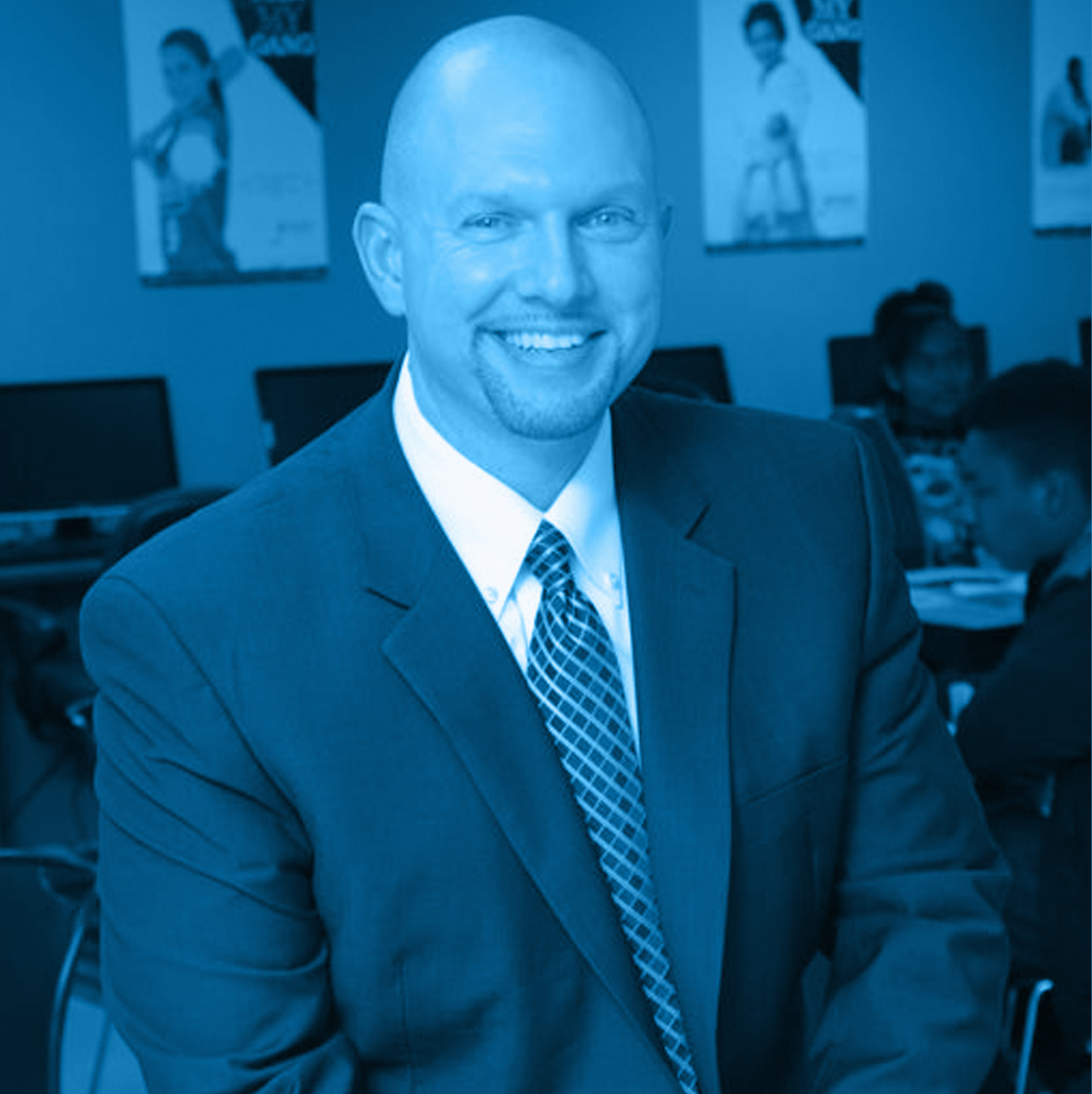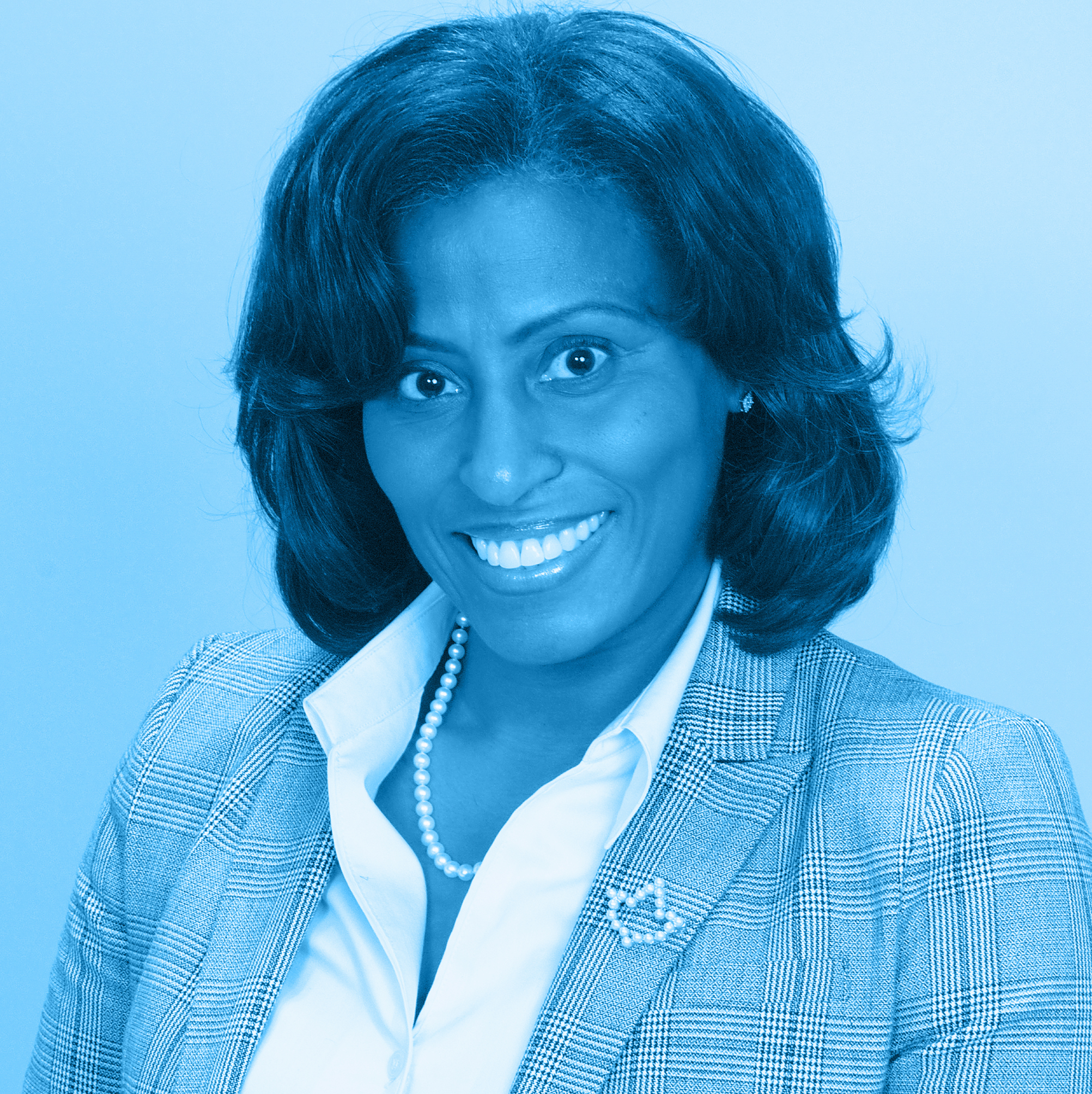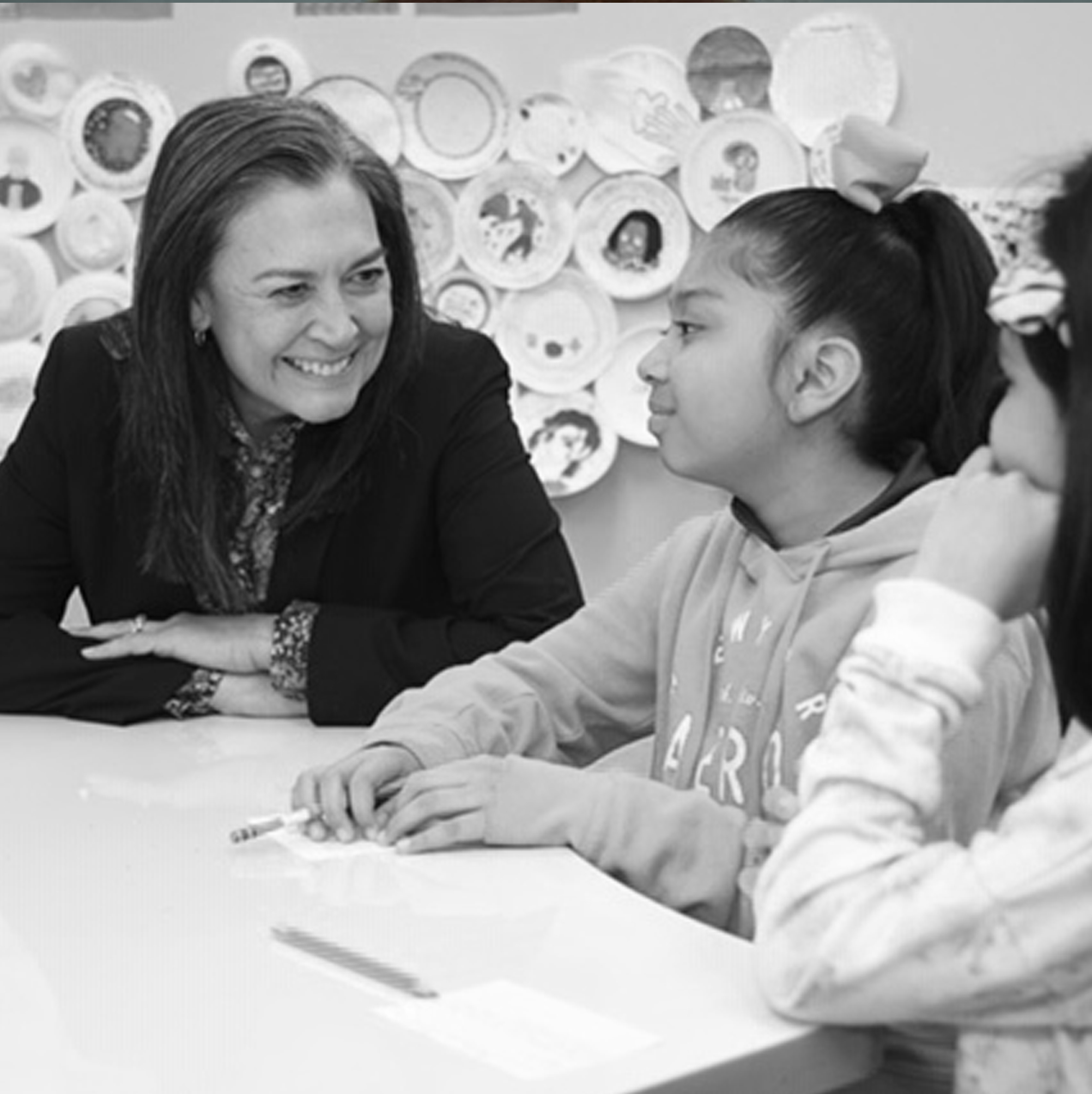FUTURE CHIEFS

Allen Smith began his career in education as a teacher in Dayton, OH. In 2003, he moved back to Denver and co-founded the only charter school in Denver focused on at-opportunity students: Skyland Community High School (SCHS). By 2006, SCHS had their first class of 100% graduation and college acceptance.
Allen then became principal of Martin Luther King Jr. Early College, which he turned around from “America’s Worst School” as it was once called, into Denver’s 4th ranked high school. MLK received two Distinguished School awards from the Colorado Department of Education and achieved some of the highest graduation rates in the district.
Allen went on to accept a position as the Executive Director of the Denver Summit Schools Network (DSSN) during the School Turnaround initiative. In his first year, all schools met or exceeded district and state expectations. In May 2012, the President of the United States honored Allen for increasing financial literacy education in his Denver schools. During this time, Allen’s accomplishments were also chronicled in the 2012 book, The Essential Role of Districts: School Turnarounds, by Heather Zavadsky.
In 2013, Allen left Denver for Charlotte-Mecklenburg School District to become the West Learning Community Superintendent. In just one year, all 22 schools achieved high growth in CMS. Allen’s departure from Charlotte came a year later when he was called to lead at the Oakland Unified School District as Chief of Schools/Deputy Superintendent. During this time, his most notable accomplishments included the transformation of low performing schools, a new school rating system, Quality School Development in equity, innovative principal supervisor development, Linked Learning and Pathways, and a revamped athletic program.
In 2016, Allen returned home to Denver to lead the Culture Equity and Leadership Team (CELT) at Denver Public Schools. This unique opportunity presented itself as DPS nationally acknowledged the impact of institutionalized racism on student achievement and employees of color. Under his leadership, CELT led the African-American Equity Task Force, a year-long initiative which worked to identify recommendations to address inequities for African-American students, educators and families. Efforts are currently underway to implement these recommendations and reconstruct how DPS is closing opportunity gaps for marginalized students and educators.
“I became an educator – to ensure that the promise of America’s public education does not abandon those who look like me, are less fortunate or less privileged. As an educator, I must instill the belief that all children, deserve and will receive a high-quality education and destroy the idea that demography is destiny.”
Allen Smith, Denver Public Schools
 Watch Allen share his personal story
Watch Allen share his personal story
 Read About our Future Chiefs in the News
Read About our Future Chiefs in the News


CHRISTINE FOWLER-MACK
Chief Portfolio Officer, Cleveland Metropolitan School District
Ohio
Read MoreChristine Fowler-Mack is an experienced and innovative leader in education and transformative practice, having served more than 25 years in diverse districts and schools. As middle child in a working-class minority household, she learned early and throughout her years, that natural talents and abilities can be maximized with optimal supports and opportunity. Faith, family, education and community have, throughout her life, centered her beliefs and actions.
One of the hallmarks of her leadership journey is that Christine Fowler Mack has served at every level of the school experience. As an elementary teacher, Fowler Mack began her career in the Akron Public Schools in Ohio. In her earliest years of teaching, she consciously sharpened her understanding of learning and teaching, understanding the changing needs and vulnerabilities of both students and teachers. Within a few years Christine was appointed as Teacher leader, a role that led soon after to her first administrative post. At the heart of Christine’s success is what many of her colleagues identify as her ability to build and maintain unique personal relationships while courageously leading change.
Her leadership journey is distinguished by strategic planning and initiatives at the highest level–processes that have consistently focused on equity, excellence in learning and teaching and innovation brought by improving conditions for learning and strong student supports.
As the Chief Portfolio Officer of the Cleveland Metropolitan School District (CMSD), Christine serves more than 39, 000 students within 106 school programs in ways that apply the best practices she has learned and taught throughout her career. The student population comprises the highest number of children of poverty in the nation, with 65 percent African American, 16% Hispanic. 16% Caucasian, and 3% other populations. Twenty- two percent are identified as students with disabilities. Fowler-Mack was recruited to the Cleveland Schools at a time when CMSD’s graduation rate was 52%, and she was challenged to devise ways to engage the Greater Cleveland community In a shared commitment to ensuring every child in Cleveland attends a high- quality school and every neighborhood has quality school choices.
As one of the chief architects of The Plan for Transforming Cleveland’s Schools (The Cleveland Plan), Christine Fowler Mack helped to create a blueprint for reinventing public education in Cleveland—a city where individual schools are now the focal point of the District’s central office resources and support. Since implementation of this strategic plan, CMSD’s graduation rate has increased 22.4%, enrolment in high-quality preschool has increased 68% and the District closed the achievement gap between Cleveland’s Hispanic and African American students and their peers, statewide.
To accomplish the most aggressive school reform agenda in CMSD’s history, the district has adopted a Portfolio District strategy and created the Office of Portfolio Planning, Growth and Management. The team Christine leads uses action research to spur continuous improvement, innovation and learning and serves as a catalyst for CMSD’s ultimate goal to become a system of high performing schools.
Fowler Mack’s design and leadership of CMSD’s annual school performance and planning framework was created to ensure CMSD has a systematic way to plan for and respond to its schools using autonomies, flexibilities, interventions, supports needed to support the District’s lowest performing schools.
As Chief Portfolio Officer, Christine spearheaded the planning and launch of over 20+ new, entrepreneurial, autonomous and accountable schools. School performance, student achievement, social / cultural indicators and partnerships are successful outcomes of this work, as shown in the District’s most recent report card that showed CMSD is the fastest growing urban district in Ohio and now outranks 113 Ohio school districts in K-3 literacy improvement.
Christine’s design and implementation of CMSD’s Office of Enrollment and Choice has led to groundbreaking personalized engagement of students and families around the selection of a school that best aligns to their interest and needs and to the development of a Charter School office—work that led Cleveland to an Effective state ranking for its authorization and management of partnerships with charter schools.
Currently, Fowler-Mack is leading a protracted and unprecedented engagement initiative that spans every sector of the population and every neighborhood community in the development of a five-year strategic facilities and resource plan. At the same time, she is developing an academic strategic plan (Excellence in Learning and Teaching), that similarly engages educators across the district in data analysis, visioning and shifts in structures and supports. With 84% of Cleveland’s third graders now being promoted to fourth grade, CMSD has an important academic indicator that renders this plan, even in its earliest stages, laudable.
Christine is a graduate of the first cohort of American Association of School Administrators and Howard University’s Urban Superintendent Program and a Future Chief for Change.
Christine Fowler Mack resides in Cleveland Heights, Ohio, with husband (Quintero Mack) and two children (Kyndall Joy Mack and Kyle Jordan Mack).
 Watch Christine share her personal story
Watch Christine share her personal story
 Read About our Future Chiefs in the News
Read About our Future Chiefs in the News


Dr. Eric Hall, Senior Chancellor of Education for the Florida Department of Education, is a long-time educator and the son of two public school teachers, has over two decades of experience serving in executive leadership, with significant expertise in the fields of education, youth development and juvenile justice. In March 2019, he returned to Florida and became the state’s first Chancellor for Innovation at the Florida Department of Education. In this role, he serves as a chief advisor to the Commissioner of Education and is instrumental in developing and implementing the state’s top education priorities. As Chancellor, he provides leadership and oversight of the Department’s Divisions of K-12 Public Schools, the Florida College System, Career and Adult Education, Vocational Rehabilitation, Blind Services, the Office of Safe Schools, and the Office of Early Learning.
Prior to accepting this position, he was the Deputy State Superintendent for Innovation at the North Carolina Department of Public Instruction, a position that oversaw multiple state divisions and initiatives, including the Office of Charter Schools, Accountability and Testing, State Standards and Curriculum, Career and Technical Education, Federal Programs and Monitoring, Advanced Learning and Gifted Education, Computer Science and Technology Education, and the Innovative School District (ISD).
Previously, Eric was the state’s founding Superintendent of the ISD. He led the launch and implementation of this new statewide school district, which operates under the administration of the North Carolina State Board of Education and the State Superintendent. The focus of the ISD is to create innovative conditions in partnership with local communities to drive improvement in student achievement at persistently low-performing schools across the state.
Before being appointed by the State Board of Education to lead the ISD, Eric served as the President and CEO of Communities In Schools of North Carolina (CISNC). In this role he led and supported a state-wide non-profit network dedicated to the effective implementation of evidence-based Integrated Student Supports and wraparound services. During Eric’s tenure with CISNC, services were delivered in more than 300 schools across the state, reaching nearly 170,000 students each year. He worked in partnership with state and local education leaders, as well as business leaders to support and sustain services aimed at improving educational opportunities for students across North Carolina.
Eric also served as the National Director of Educational Services for AMIkids, Inc., a nonprofit organization providing intervention services to youth in juvenile justice programs and nontraditional schools in nine states. During his tenure at AMIkids, he spearheaded the creation of educator and school-leader training programs, as well as the development of curriculum and instructional strategies aimed at accelerating student academic achievement, while also being responsible for a portfolio of 56 schools.
Eric’s other career experience includes successful board and community development; strategic planning; education innovation; educator and school leader development; and significant experience building and fostering partnerships across agencies and organizations to support aligned missions and visions. He began his career as a teacher, then later transitioned into school leadership, and soon after promoted to lead the implementation of education and juvenile justice reforms in Florida and other states across the nation.
Eric holds a bachelor’s degree in Secondary Science Education, a master’s degree in Educational Leadership, and a doctorate in Educational Leadership and Policy Studies from the University of South Florida. His research has been published in academic journals and books, with topics focused on student discipline, the school-to-prison pipeline, school leadership, and non-traditional schools. He has been the recipient of numerous awards recognizing his outstanding leadership and his role in facilitating state-level policy-making initiatives. In December 2015, Eric was appointed by then-Governor Pat McCrory in North Carolina to serve on the NC-Works Commission, the state’s workforce board, and served as a member of the commission’s Executive Committee. His role on the commission was as Chairman of the Pathways Committee, which focused on post-secondary education training and credentials attainment. He has also served on the North Carolina State Board of Education’s Interagency Advisory Committee and Whole Child NC Committee, as appointed by the Board and the State Superintendent. In his current role at the Florida Department of Education, he serves on the Florida Career-Source Board, is the chair for the State Advisory Council on Early Learning, and sits on several boards and commissions as the designee for the Commissioner of Education.
 Watch Eric share his personal story
Watch Eric share his personal story
 Read About our Future Chiefs in the News
Read About our Future Chiefs in the News


JESSICA BAGHIAN
Assistant State Superintendent of Assessment, Accountability, Analytics and Early Childhood, Louisiana Department of Education
Louisiana
Read MoreAs Assistant Superintendent for the Louisiana Department of Education, Jessica Baghian is committed to ensuring high expectations and increased access for every child in Louisiana. Baghian leads Louisiana’s early childhood to grade 12 assessment and accountability systems, as well as its early childhood strategy and operations, and the research and analytics functions for the state Department of Education. In this role, Baghian developed and implemented Louisiana’s nationally-competitive statewide assessment, accountability, and performance systems for districts, schools, early childhood providers, and educators. Since implementation of these systems, record numbers of Louisiana students graduated in four years, graduated with postsecondary credentials, received state-funded postsecondary scholarships, and enrolled in college. Baghian is a graduate of Louisiana State University and Harvard Law School. She began her career as a middle school math teacher in St. John Parish, Louisiana.
 Watch Jessica share her personal story
Watch Jessica share her personal story
 Read About our Future Chiefs in the News
Read About our Future Chiefs in the News


Aleesia Johnson, a member of Chiefs for Change’s fourth Future Chief cohort, has served as the superintendent of Indianapolis Public Schools (IPS), Indiana’s largest public school district, since July 2019. She is a dynamic and collaborative leader who has demonstrated an uncompromising commitment to educational quality and equity over the course of her career.
Johnson has been an educator for more than 16 years, achieving success as a teacher, school leader, and administrator in both public charter and traditional district schools. A Teach For America alum, Johnson led KIPP Indy College Prep Middle School from 2012 until 2015, meeting or exceeding student achievement standards and increasing student retention year over year. In 2015, Johnson joined IPS as innovation officer and was responsible for developing and implementing an innovation and autonomy strategy across the district of more than 30,000 students, most of whom are children of color from economically disadvantaged backgrounds. She launched and expanded a new autonomous school model within the district and helped transform the central office to better support individual schools.
Prior to being named IPS superintendent, Johnson was deputy superintendent for academics in the district. She oversaw all aspects of curriculum and instruction, performance and continuous improvement, postsecondary readiness, special education, student services and portfolio initiatives. She launched the implementation of academic strategies that led to increased student academic outcomes and postsecondary success based on the district’s 3Es (preparing students for enrollment in a two- or four-year college or university, enlistment in the military, or employment at a livable wage upon graduation).
A native of Evansville, Indiana, Johnson comes from a long line of educators, including her mother, who’s an elementary school principal; and her grandfather, Anthony Brooks, one of the few African-American administrators in the Evansville area in the 1970s and 1980s. Johnson is married and has an adult stepdaughter and three school-aged children who attend IPS.
 Watch Aleesia share her personal story
Watch Aleesia share her personal story
 Read About our Future Chiefs in the News
Read About our Future Chiefs in the News


As the Chief Education Officer of the Chicago Public Schools(CPS), LaTanya oversees all academic offices within the CPS Central Office and supports all principals and Network Chiefs in their leadership roles. This was a natural transition from her previous role as Chief Officer of the Office of Teaching and Learning (T & L), where she managed all core academic departments and oversaw the design, implementation, and evaluation of instructional programs and services for CPS teachers and administrators.
In this role, Mrs. McDade worked to streamline and reduce waste by aligning T&L’s programs to district priorities and advocate for the consistent, formal evaluation/ROI assessment of services and supports provided by central office departments. As a veteran educator, she also challenged the efficacy of traditional education models and initiated the PK-12 Curriculum System Project to modernize instructional practices across the district.
In her previous role as Chief Officer for Network 12, Mrs. McDade led the transformation and expansion of instruction-centered programs for a diverse portfolio of 37 elementary and high schools, yielding the highest gains across all networks for NWEA in Literacy and Math, Grade 3-8. A proud product of CPS, LaTanya was a student in Chicago from Kindergarten through 12th grade and went on to dedicate her entire career to the children of Chicago. In all of her various roles, which include teacher, assistant principal, principal, and Network Chief, she has prioritized instructional equity and excellence for every child and has challenged the efficacy of traditional education models, advocating for the modernization of instructional practices throughout the District.
With nearly 20 years of experience in Chicago Public Schools, LaTanya understands our school communities and knows how to support their academic growth. A passionate believer in lifelong learning, she holds a Bachelor’s Degree in Elementary Education and an M.A. in Leadership and Administration and is currently pursuing her doctoral degree.
 Watch LaTanya share her personal story
Watch LaTanya share her personal story
 Read About our Future Chiefs in the News
Read About our Future Chiefs in the News


Marie Izquierdo is a career educator with more than 25 years of experience in school reform. She is the Chief Academic Officer for Miami-Dade County Public Schools (M-DCPS), the nation’s fourth largest school system, which serves more than 350,000 students and employs 53,000 teachers and staff.
A former social studies teacher focused on dropout prevention, Izquierdo began her leadership career as the assistant principal for curriculum at Ponce de Leon Middle School in Coral Gables, where she worked to dramatically improve student achievement. During her tenure as a principal at Henry M. Flagler Elementary, the school went from being a C-rated school that had not met the requirements of No Child Left Behind (NCLB) to a three-time A-rated school meeting NCLB.
In 2009, the Florida Department of Education recruited Izquierdo to boost student achievement in the state’s lowest performing schools as a Regional Executive Director. Under her leadership, 79% of targeted schools improved both their school grade and percentage of adequate yearly progress; 38% of those schools improved by two or more letter grades; and two schools went from F to A and met 100% of the requirements of NCLB.
Later, as deputy chief of staff to M-DCPS Superintendent Alberto Carvalho, she was instrumental in the favorable pass age of a $1.2 billion General Obligation Bond for renovating school facilities and purchasing new technology as well as M-DCPS earning the prestigious Broad Prize in Urban Education in 2012.
As Chief Academic Officer (CAO), Izquierdo has spearheaded efforts that have yielded a historic 84% graduation rate and the distinction of having 98% of all schools rated A, B or C by the Florida Department of Education. She oversees the Education Transformation Office, an office that supports the lowest performing schools in the district, successfully eradicating all F schools in the district for the past two school years. A fervent proponent of school choice, she also leads the Innovation and Choice Office that has earned the district a staggering 302 National Magnet Merit Awards, the 2017 Donna Grady-Creer District Award for Magnet Sustainability, and the College Board Award for Equity and Access. She has spearheaded the district’s touted Digital Convergence Initiative that has revolutionized teaching and learning in Miami Dade and placed over 172,000 mobile devices in the hands of students. She has significantly expanded early childhood learning opportunities, career and technical education, and advanced academic programming such as AP and Dual Enrollment. In 2016 she was named one of the Center for Digital Education’s Top 30 Technologists, Transformers and Trailblazers, is an alum of the prestigious Broad Academy, and in 2019 she was honored with the Women in Leadership Award from the American Association of School Administrators.
Ms. Izquierdo resides in Miami with her husband and three children.
 Watch Marie share her personal story
Watch Marie share her personal story
 Read About our Future Chiefs in the News
Read About our Future Chiefs in the News


MOHAMMED CHOUDHURY
Chief Innovation Officer, San Antonio Independent School District
Texas
Read MoreMohammed Choudhury is the chief innovation officer at the San Antonio Independent School District. In this capacity he is entrusted with incubating and scaling high-leverage school design and turnaround initiatives, that will have the greatest impact on moving the needle on student achievement during an exciting inflection point for the city of San Antonio. Recently, Mohammed served as the interim chief and founding director of the Office of Transformation and Innovation at the Dallas Independent School District. He spearheaded the district’s Public School Choice initiative to redesign existing neighborhood campuses and launch new, startup open enrollment school models to expand high quality options for all students, regardless of their academic abilities or geographic constraints.
Previously, Mohammed served in teacher leadership roles developing and operationalizing successful school turnaround and change-management initiatives within the Los Angeles Unified School District. He has also served as a Teach Plus Teaching Policy and Education Pioneers fellow developing district, state, and national-level education policies focused on teacher preparation, development, and leadership.
Mohammed began his career in education as a middle school English as a Second Language, social studies, and intervention teacher in the Pico-Union neighborhood of Central Los Angeles. He is a NextGen Network leader at the Pahara-Aspen Institute. The NextGen Network is a leadership development program that aims to identify and develop a diverse group of emerging senior leaders with the potential to strengthen and shape the future of the educational excellence and equity movement. Mohammed holds a master’s in urban schooling from the Teacher Education Program at the University of California, Los Angeles.
 Watch Mohammed share his personal story
Watch Mohammed share his personal story
 Read About our Future Chiefs in the News
Read About our Future Chiefs in the News


Dr. Pauline Dow was named Vice President of the Holdsworth Center in September 2019. Headquartered in Austin, The Holdsworth Center offers world-class leadership development to school districts selected to participate through a generous multi-year investment. Pauline supports the center in partnering with school districts over a 5-year period to grow and develop their own pipeline of outstanding leaders. The center currently partners with 13 school districts across Texas that collectively educate a diverse population of 460,000 students and employ 60,000 staff members.
Prior to this, Pauline served as Deputy Superintendent for Academics and School Leadership for the San Antonio ISD. In this role, she led the overall academic, instruction and school leadership vision and implementation for a large, majority-minority urban district with 47,000 students in 90 learning sites. She established active learning for students that was differentiated and streamlined support to SAISD principals and teachers. From 2017-2019, the district rating moved from D to B on the state accountability system, the number of low performing schools was reduced by 50% in one year, and the district matched or exceeded state gains in most performance levels in grades 2-8 in 2019. High school End-of-Course exams exceeded state gains in almost every performance level in 2019, and high school graduation rates increased to 84.4% in 2019, up from 83.1% in 2017.
She has also served as chief instructional officer for North East ISD and as chief academic officer for Austin ISD. In each of these roles, she led broad stakeholder teams in developing a shared vision for excellent and equitable student results, and helped implement that vision across curriculum, instruction and assessment.
Pauline spent 22 years of her career in her hometown of El Paso, Texas as a bilingual teacher, and district leader in Ysleta ISD and Canutillo ISD. She is a former fellow of the Kellogg National Leadership Program, a multi-disciplinary experience that fosters a global perspective on human and social issues.
Dow has more than 30 years of experience in public education. She holds bachelor’s and master’s degrees in history and education from The University of Texas at El Paso and a doctoral degree also from The University of Texas at El Paso. She is a recipient of the Gold Nugget Award for the College of Education and Dissertation of the Year Award from The University of Texas at El Paso.
 Watch Pauline share her personal story
Watch Pauline share her personal story
 Read About our Future Chiefs in the News
Read About our Future Chiefs in the News

COHORT 4
Cohort at-a-Glance
- 89% leaders of color
- 100% current or former state and local education leaders
- 100% committed to ensuring all students have a quality education
 Future Chiefs Programming
Future Chiefs Programming
 Nominate a Future Chief
Nominate a Future Chief
 Future Chiefs in the News
Future Chiefs in the News
 Read Announcement of Cohort 4
Read Announcement of Cohort 4
COHORT 4
Cohort at-a-Glance
- 89% leaders of color
- 100% current or former state and local education leaders
- 100% committed to ensuring all students have a quality education
 Future Chiefs Programming
Future Chiefs Programming
 Nominate a Future Chief
Nominate a Future Chief
 Future Chiefs in the News
Future Chiefs in the News
 Read Announcement of Cohort 4
Read Announcement of Cohort 4

Allen Smith began his career in education as a teacher in Dayton, OH. In 2003, he moved back to Denver and co-founded the only charter school in Denver focused on at-opportunity students: Skyland Community High School (SCHS). By 2006, SCHS had their first class of 100% graduation and college acceptance.
Allen then became principal of Martin Luther King Jr. Early College, which he turned around from “America’s Worst School” as it was once called, into Denver’s 4th ranked high school. MLK received two Distinguished School awards from the Colorado Department of Education and achieved some of the highest graduation rates in the district.
Allen went on to accept a position as the Executive Director of the Denver Summit Schools Network (DSSN) during the School Turnaround initiative. In his first year, all schools met or exceeded district and state expectations. In May 2012, the President of the United States honored Allen for increasing financial literacy education in his Denver schools. During this time, Allen’s accomplishments were also chronicled in the 2012 book, The Essential Role of Districts: School Turnarounds, by Heather Zavadsky.
In 2013, Allen left Denver for Charlotte-Mecklenburg School District to become the West Learning Community Superintendent. In just one year, all 22 schools achieved high growth in CMS. Allen’s departure from Charlotte came a year later when he was called to lead at the Oakland Unified School District as Chief of Schools/Deputy Superintendent. During this time, his most notable accomplishments included the transformation of low performing schools, a new school rating system, Quality School Development in equity, innovative principal supervisor development, Linked Learning and Pathways, and a revamped athletic program.
In 2016, Allen returned home to Denver to lead the Culture Equity and Leadership Team (CELT) at Denver Public Schools. This unique opportunity presented itself as DPS nationally acknowledged the impact of institutionalized racism on student achievement and employees of color. Under his leadership, CELT led the African-American Equity Task Force, a year-long initiative which worked to identify recommendations to address inequities for African-American students, educators and families. Efforts are currently underway to implement these recommendations and reconstruct how DPS is closing opportunity gaps for marginalized students and educators.
“I became an educator – to ensure that the promise of America’s public education does not abandon those who look like me, are less fortunate or less privileged. As an educator, I must instill the belief that all children, deserve and will receive a high-quality education and destroy the idea that demography is destiny.”
Allen Smith, Denver Public Schools
 Watch Allen share his personal story
Watch Allen share his personal story
 Read About our Future Chiefs in the News
Read About our Future Chiefs in the News


Christine Fowler-Mack is an experienced and innovative leader in education and transformative practice, having served more than 25 years in diverse districts and schools. As middle child in a working-class minority household, she learned early and throughout her years, that natural talents and abilities can be maximized with optimal supports and opportunity. Faith, family, education and community have, throughout her life, centered her beliefs and actions.
One of the hallmarks of her leadership journey is that Christine Fowler Mack has served at every level of the school experience. As an elementary teacher, Fowler Mack began her career in the Akron Public Schools in Ohio. In her earliest years of teaching, she consciously sharpened her understanding of learning and teaching, understanding the changing needs and vulnerabilities of both students and teachers. Within a few years Christine was appointed as Teacher leader, a role that led soon after to her first administrative post. At the heart of Christine’s success is what many of her colleagues identify as her ability to build and maintain unique personal relationships while courageously leading change.
Her leadership journey is distinguished by strategic planning and initiatives at the highest level–processes that have consistently focused on equity, excellence in learning and teaching and innovation brought by improving conditions for learning and strong student supports.
As the Chief Portfolio Officer of the Cleveland Metropolitan School District (CMSD), Christine serves more than 39, 000 students within 106 school programs in ways that apply the best practices she has learned and taught throughout her career. The student population comprises the highest number of children of poverty in the nation, with 65 percent African American, 16% Hispanic. 16% Caucasian, and 3% other populations. Twenty- two percent are identified as students with disabilities. Fowler-Mack was recruited to the Cleveland Schools at a time when CMSD’s graduation rate was 52%, and she was challenged to devise ways to engage the Greater Cleveland community In a shared commitment to ensuring every child in Cleveland attends a high- quality school and every neighborhood has quality school choices.
As one of the chief architects of The Plan for Transforming Cleveland’s Schools (The Cleveland Plan), Christine Fowler Mack helped to create a blueprint for reinventing public education in Cleveland—a city where individual schools are now the focal point of the District’s central office resources and support. Since implementation of this strategic plan, CMSD’s graduation rate has increased 22.4%, enrolment in high-quality preschool has increased 68% and the District closed the achievement gap between Cleveland’s Hispanic and African American students and their peers, statewide.
To accomplish the most aggressive school reform agenda in CMSD’s history, the district has adopted a Portfolio District strategy and created the Office of Portfolio Planning, Growth and Management. The team Christine leads uses action research to spur continuous improvement, innovation and learning and serves as a catalyst for CMSD’s ultimate goal to become a system of high performing schools.
Fowler Mack’s design and leadership of CMSD’s annual school performance and planning framework was created to ensure CMSD has a systematic way to plan for and respond to its schools using autonomies, flexibilities, interventions, supports needed to support the District’s lowest performing schools.
As Chief Portfolio Officer, Christine spearheaded the planning and launch of over 20+ new, entrepreneurial, autonomous and accountable schools. School performance, student achievement, social / cultural indicators and partnerships are successful outcomes of this work, as shown in the District’s most recent report card that showed CMSD is the fastest growing urban district in Ohio and now outranks 113 Ohio school districts in K-3 literacy improvement.
Christine’s design and implementation of CMSD’s Office of Enrollment and Choice has led to groundbreaking personalized engagement of students and families around the selection of a school that best aligns to their interest and needs and to the development of a Charter School office—work that led Cleveland to an Effective state ranking for its authorization and management of partnerships with charter schools.
Currently, Fowler-Mack is leading a protracted and unprecedented engagement initiative that spans every sector of the population and every neighborhood community in the development of a five-year strategic facilities and resource plan. At the same time, she is developing an academic strategic plan (Excellence in Learning and Teaching), that similarly engages educators across the district in data analysis, visioning and shifts in structures and supports. With 84% of Cleveland’s third graders now being promoted to fourth grade, CMSD has an important academic indicator that renders this plan, even in its earliest stages, laudable.
Christine is a graduate of the first cohort of American Association of School Administrators and Howard University’s Urban Superintendent Program and a Future Chief for Change.
Christine Fowler Mack resides in Cleveland Heights, Ohio, with husband (Quintero Mack) and two children (Kyndall Joy Mack and Kyle Jordan Mack).
 Watch Christine share her personal story
Watch Christine share her personal story
 Read About our Future Chiefs in the News
Read About our Future Chiefs in the News


Dr. Eric Hall, Senior Chancellor of Education for the Florida Department of Education, is a long-time educator and the son of two public school teachers, has over two decades of experience serving in executive leadership, with significant expertise in the fields of education, youth development and juvenile justice. In March 2019, he returned to Florida and became the state’s first Chancellor for Innovation at the Florida Department of Education. In this role, he serves as a chief advisor to the Commissioner of Education and is instrumental in developing and implementing the state’s top education priorities. As Chancellor, he provides leadership and oversight of the Department’s Divisions of K-12 Public Schools, the Florida College System, Career and Adult Education, Vocational Rehabilitation, Blind Services, the Office of Safe Schools, and the Office of Early Learning.
Prior to accepting this position, he was the Deputy State Superintendent for Innovation at the North Carolina Department of Public Instruction, a position that oversaw multiple state divisions and initiatives, including the Office of Charter Schools, Accountability and Testing, State Standards and Curriculum, Career and Technical Education, Federal Programs and Monitoring, Advanced Learning and Gifted Education, Computer Science and Technology Education, and the Innovative School District (ISD).
Previously, Eric was the state’s founding Superintendent of the ISD. He led the launch and implementation of this new statewide school district, which operates under the administration of the North Carolina State Board of Education and the State Superintendent. The focus of the ISD is to create innovative conditions in partnership with local communities to drive improvement in student achievement at persistently low-performing schools across the state.
Before being appointed by the State Board of Education to lead the ISD, Eric served as the President and CEO of Communities In Schools of North Carolina (CISNC). In this role he led and supported a state-wide non-profit network dedicated to the effective implementation of evidence-based Integrated Student Supports and wraparound services. During Eric’s tenure with CISNC, services were delivered in more than 300 schools across the state, reaching nearly 170,000 students each year. He worked in partnership with state and local education leaders, as well as business leaders to support and sustain services aimed at improving educational opportunities for students across North Carolina.
Eric also served as the National Director of Educational Services for AMIkids, Inc., a nonprofit organization providing intervention services to youth in juvenile justice programs and nontraditional schools in nine states. During his tenure at AMIkids, he spearheaded the creation of educator and school-leader training programs, as well as the development of curriculum and instructional strategies aimed at accelerating student academic achievement, while also being responsible for a portfolio of 56 schools.
Eric’s other career experience includes successful board and community development; strategic planning; education innovation; educator and school leader development; and significant experience building and fostering partnerships across agencies and organizations to support aligned missions and visions. He began his career as a teacher, then later transitioned into school leadership, and soon after promoted to lead the implementation of education and juvenile justice reforms in Florida and other states across the nation.
Eric holds a bachelor’s degree in Secondary Science Education, a master’s degree in Educational Leadership, and a doctorate in Educational Leadership and Policy Studies from the University of South Florida. His research has been published in academic journals and books, with topics focused on student discipline, the school-to-prison pipeline, school leadership, and non-traditional schools. He has been the recipient of numerous awards recognizing his outstanding leadership and his role in facilitating state-level policy-making initiatives. In December 2015, Eric was appointed by then-Governor Pat McCrory in North Carolina to serve on the NC-Works Commission, the state’s workforce board, and served as a member of the commission’s Executive Committee. His role on the commission was as Chairman of the Pathways Committee, which focused on post-secondary education training and credentials attainment. He has also served on the North Carolina State Board of Education’s Interagency Advisory Committee and Whole Child NC Committee, as appointed by the Board and the State Superintendent. In his current role at the Florida Department of Education, he serves on the Florida Career-Source Board, is the chair for the State Advisory Council on Early Learning, and sits on several boards and commissions as the designee for the Commissioner of Education.
 Watch Eric share his personal story
Watch Eric share his personal story
 Read About our Future Chiefs in the News
Read About our Future Chiefs in the News


As Assistant Superintendent for the Louisiana Department of Education, Jessica Baghian is committed to ensuring high expectations and increased access for every child in Louisiana. Baghian leads Louisiana’s early childhood to grade 12 assessment and accountability systems, as well as its early childhood strategy and operations, and the research and analytics functions for the state Department of Education. In this role, Baghian developed and implemented Louisiana’s nationally-competitive statewide assessment, accountability, and performance systems for districts, schools, early childhood providers, and educators. Since implementation of these systems, record numbers of Louisiana students graduated in four years, graduated with postsecondary credentials, received state-funded postsecondary scholarships, and enrolled in college. Baghian is a graduate of Louisiana State University and Harvard Law School. She began her career as a middle school math teacher in St. John Parish, Louisiana.
 Watch Jessica share her personal story
Watch Jessica share her personal story
 Read About our Future Chiefs in the News
Read About our Future Chiefs in the News


Aleesia Johnson, a member of Chiefs for Change’s fourth Future Chief cohort, has served as the superintendent of Indianapolis Public Schools (IPS), Indiana’s largest public school district, since July 2019. She is a dynamic and collaborative leader who has demonstrated an uncompromising commitment to educational quality and equity over the course of her career.
Johnson has been an educator for more than 16 years, achieving success as a teacher, school leader, and administrator in both public charter and traditional district schools. A Teach For America alum, Johnson led KIPP Indy College Prep Middle School from 2012 until 2015, meeting or exceeding student achievement standards and increasing student retention year over year. In 2015, Johnson joined IPS as innovation officer and was responsible for developing and implementing an innovation and autonomy strategy across the district of more than 30,000 students, most of whom are children of color from economically disadvantaged backgrounds. She launched and expanded a new autonomous school model within the district and helped transform the central office to better support individual schools.
Prior to being named IPS superintendent, Johnson was deputy superintendent for academics in the district. She oversaw all aspects of curriculum and instruction, performance and continuous improvement, postsecondary readiness, special education, student services and portfolio initiatives. She launched the implementation of academic strategies that led to increased student academic outcomes and postsecondary success based on the district’s 3Es (preparing students for enrollment in a two- or four-year college or university, enlistment in the military, or employment at a livable wage upon graduation).
A native of Evansville, Indiana, Johnson comes from a long line of educators, including her mother, who’s an elementary school principal; and her grandfather, Anthony Brooks, one of the few African-American administrators in the Evansville area in the 1970s and 1980s. Johnson is married and has an adult stepdaughter and three school-aged children who attend IPS.
 Watch Aleesia share her personal story
Watch Aleesia share her personal story
 Read About our Future Chiefs in the News
Read About our Future Chiefs in the News


As the Chief Education Officer of the Chicago Public Schools(CPS), LaTanya oversees all academic offices within the CPS Central Office and supports all principals and Network Chiefs in their leadership roles. This was a natural transition from her previous role as Chief Officer of the Office of Teaching and Learning (T & L), where she managed all core academic departments and oversaw the design, implementation, and evaluation of instructional programs and services for CPS teachers and administrators.
In this role, Mrs. McDade worked to streamline and reduce waste by aligning T&L’s programs to district priorities and advocate for the consistent, formal evaluation/ROI assessment of services and supports provided by central office departments. As a veteran educator, she also challenged the efficacy of traditional education models and initiated the PK-12 Curriculum System Project to modernize instructional practices across the district.
In her previous role as Chief Officer for Network 12, Mrs. McDade led the transformation and expansion of instruction-centered programs for a diverse portfolio of 37 elementary and high schools, yielding the highest gains across all networks for NWEA in Literacy and Math, Grade 3-8. A proud product of CPS, LaTanya was a student in Chicago from Kindergarten through 12th grade and went on to dedicate her entire career to the children of Chicago. In all of her various roles, which include teacher, assistant principal, principal, and Network Chief, she has prioritized instructional equity and excellence for every child and has challenged the efficacy of traditional education models, advocating for the modernization of instructional practices throughout the District.
With nearly 20 years of experience in Chicago Public Schools, LaTanya understands our school communities and knows how to support their academic growth. A passionate believer in lifelong learning, she holds a Bachelor’s Degree in Elementary Education and an M.A. in Leadership and Administration and is currently pursuing her doctoral degree.
 Watch LaTanya share her personal story
Watch LaTanya share her personal story
 Read About our Future Chiefs in the News
Read About our Future Chiefs in the News


Marie Izquierdo is a career educator with more than 25 years of experience in school reform. She is the Chief Academic Officer for Miami-Dade County Public Schools (M-DCPS), the nation’s fourth largest school system, which serves more than 350,000 students and employs 53,000 teachers and staff.
A former social studies teacher focused on dropout prevention, Izquierdo began her leadership career as the assistant principal for curriculum at Ponce de Leon Middle School in Coral Gables, where she worked to dramatically improve student achievement. During her tenure as a principal at Henry M. Flagler Elementary, the school went from being a C-rated school that had not met the requirements of No Child Left Behind (NCLB) to a three-time A-rated school meeting NCLB.
In 2009, the Florida Department of Education recruited Izquierdo to boost student achievement in the state’s lowest performing schools as a Regional Executive Director. Under her leadership, 79% of targeted schools improved both their school grade and percentage of adequate yearly progress; 38% of those schools improved by two or more letter grades; and two schools went from F to A and met 100% of the requirements of NCLB.
Later, as deputy chief of staff to M-DCPS Superintendent Alberto Carvalho, she was instrumental in the favorable pass age of a $1.2 billion General Obligation Bond for renovating school facilities and purchasing new technology as well as M-DCPS earning the prestigious Broad Prize in Urban Education in 2012.
As Chief Academic Officer (CAO), Izquierdo has spearheaded efforts that have yielded a historic 84% graduation rate and the distinction of having 98% of all schools rated A, B or C by the Florida Department of Education. She oversees the Education Transformation Office, an office that supports the lowest performing schools in the district, successfully eradicating all F schools in the district for the past two school years. A fervent proponent of school choice, she also leads the Innovation and Choice Office that has earned the district a staggering 302 National Magnet Merit Awards, the 2017 Donna Grady-Creer District Award for Magnet Sustainability, and the College Board Award for Equity and Access. She has spearheaded the district’s touted Digital Convergence Initiative that has revolutionized teaching and learning in Miami Dade and placed over 172,000 mobile devices in the hands of students. She has significantly expanded early childhood learning opportunities, career and technical education, and advanced academic programming such as AP and Dual Enrollment. In 2016 she was named one of the Center for Digital Education’s Top 30 Technologists, Transformers and Trailblazers, is an alum of the prestigious Broad Academy, and in 2019 she was honored with the Women in Leadership Award from the American Association of School Administrators.
Ms. Izquierdo resides in Miami with her husband and three children.
 Watch Marie share her personal story
Watch Marie share her personal story
 Read About our Future Chiefs in the News
Read About our Future Chiefs in the News


Mohammed Choudhury is the chief innovation officer at the San Antonio Independent School District. In this capacity he is entrusted with incubating and scaling high-leverage school design and turnaround initiatives, that will have the greatest impact on moving the needle on student achievement during an exciting inflection point for the city of San Antonio. Recently, Mohammed served as the interim chief and founding director of the Office of Transformation and Innovation at the Dallas Independent School District. He spearheaded the district’s Public School Choice initiative to redesign existing neighborhood campuses and launch new, startup open enrollment school models to expand high quality options for all students, regardless of their academic abilities or geographic constraints.
Previously, Mohammed served in teacher leadership roles developing and operationalizing successful school turnaround and change-management initiatives within the Los Angeles Unified School District. He has also served as a Teach Plus Teaching Policy and Education Pioneers fellow developing district, state, and national-level education policies focused on teacher preparation, development, and leadership.
Mohammed began his career in education as a middle school English as a Second Language, social studies, and intervention teacher in the Pico-Union neighborhood of Central Los Angeles. He is a NextGen Network leader at the Pahara-Aspen Institute. The NextGen Network is a leadership development program that aims to identify and develop a diverse group of emerging senior leaders with the potential to strengthen and shape the future of the educational excellence and equity movement. Mohammed holds a master’s in urban schooling from the Teacher Education Program at the University of California, Los Angeles.
 Watch Mohammed share his personal story
Watch Mohammed share his personal story
 Read About our Future Chiefs in the News
Read About our Future Chiefs in the News


Dr. Pauline Dow was named Vice President of the Holdsworth Center in September 2019. Headquartered in Austin, The Holdsworth Center offers world-class leadership development to school districts selected to participate through a generous multi-year investment. Pauline supports the center in partnering with school districts over a 5-year period to grow and develop their own pipeline of outstanding leaders. The center currently partners with 13 school districts across Texas that collectively educate a diverse population of 460,000 students and employ 60,000 staff members.
Prior to this, Pauline served as Deputy Superintendent for Academics and School Leadership for the San Antonio ISD. In this role, she led the overall academic, instruction and school leadership vision and implementation for a large, majority-minority urban district with 47,000 students in 90 learning sites. She established active learning for students that was differentiated and streamlined support to SAISD principals and teachers. From 2017-2019, the district rating moved from D to B on the state accountability system, the number of low performing schools was reduced by 50% in one year, and the district matched or exceeded state gains in most performance levels in grades 2-8 in 2019. High school End-of-Course exams exceeded state gains in almost every performance level in 2019, and high school graduation rates increased to 84.4% in 2019, up from 83.1% in 2017.
She has also served as chief instructional officer for North East ISD and as chief academic officer for Austin ISD. In each of these roles, she led broad stakeholder teams in developing a shared vision for excellent and equitable student results, and helped implement that vision across curriculum, instruction and assessment.
Pauline spent 22 years of her career in her hometown of El Paso, Texas as a bilingual teacher, and district leader in Ysleta ISD and Canutillo ISD. She is a former fellow of the Kellogg National Leadership Program, a multi-disciplinary experience that fosters a global perspective on human and social issues.
Dow has more than 30 years of experience in public education. She holds bachelor’s and master’s degrees in history and education from The University of Texas at El Paso and a doctoral degree also from The University of Texas at El Paso. She is a recipient of the Gold Nugget Award for the College of Education and Dissertation of the Year Award from The University of Texas at El Paso.
 Watch Pauline share her personal story
Watch Pauline share her personal story
 Read About our Future Chiefs in the News
Read About our Future Chiefs in the News


